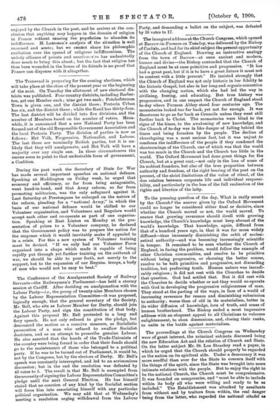To the pressing question of the day, What is really
meant by the Church ? the answer given by the Oxford Movement could no longer be considered either final or decisive, since whether the Church moved or not, the world moved. To ensure that growing reverence should dwell with growing knowledge, the Church's knowledge must keep abreast of the world's knowledge. That knowledge, again, differed from that of a hundred years ago, in that it was far more widely diffused—thus immensely diminishing the orbit of ecclesi- astical authority—and was becoming increasingly scientific in temper. It remained to be seen whether the Church of England, in facing the problem, would follow the example of other Christian communities, and resolve to be primitive without being progressive, or choosing the better course, resolve to be both primitive and progressive, not discarding tradition, but preferring truth. Human nature was ineradi- cably religious ; it did not rest with the Churches to decide that question. God had settled that. But it did rest with the Churches to decide whether or not they would co-operate with God in developing the progressive religiousness of man. They stood at the parting of the ways, in face of a, world of increasing reverence for reason and diminishing submission to authority; worse than of old in its materialism, better in its wider diffusion of knowledge, love of truth, and sense of human brotherhood. The Bishop ended a most impressive address with an eloquent appeal to all Christians to welcome enlightenment, to shun dissensions, and, closing their ranks, to unite in the battle against materialism.






























































 Previous page
Previous page